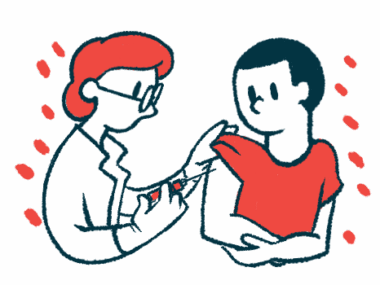Past Experiences Make Me Wonder About My Daughter’s Future Friendships
The importance of friends who can help and support you through health issues
Written by |

Each breath she attempted to take was mixed with a desperate cough that sounded like gravel under a construction boot. Instinctively, I tried to get closer to help, as did others who were witnessing the medical emergency, but her friend who had knelt on the floor with her ordered us to back away. My dancer, Tibby, had collapsed against the auditorium wall in the middle of a rehearsal as she succumbed to a severe asthma attack.
In 2009, as the artistic director and choreographer of a modern dance troupe, I was hypersensitive to the muscles and bones of my performers. However, nothing prepared me for lung and bronchial issues. I had heard a lot about them and seen a few acted out on television, but I’d never witnessed an asthma attack. Yet here I was, watching my newest dancer’s two friends render aid to her as she seemed to teeter near death.
Suddenly, one friend grabbed Tibby’s inhaler while the other set up her nebulizer. About half an hour later, Tibby was back in rehearsal, executing some modified choreography.
By 2013, Tibby and I had become close friends. Throughout our friendship, I was gently introduced to all the things she was allergic to (which turned into hilarious inside jokes), how to set up her nebulizer, where she kept it, and the trick to plugging in the breathing tube. On one such occasion, I was the “rendering aid friend,” surrounded by people who didn’t know what to do.
When my oldest daughter, whom we lovingly refer to as Ladybug, was diagnosed with asthma in 2017, Tibby helped us through it. She guided Ladybug through what it felt like when an attack was coming, and would even call me on terrible air-quality days to let me know I needed to keep an eye on her.
Recently, I realized that all of us in my close circle of friends know one another’s medical issues. The idea of being surrounded by people who are aware you have to navigate life differently and know how to help in emergencies makes you feel good.
“Do your friends know about your hereditary angioedema?” I asked Ladybug at the beginning of this school year.
“No,” she finally said. “I don’t need them looking at me all the time.”
Admittedly, her answer triggered my maternal anxiety. And as much as I tried to stay in the moment, my brain went off the deep end.
I thought about the first time I witnessed Tibby’s asthma attack. Her mom wasn’t there to hold her hand or tell us what to do. Instead, her friends made sure she didn’t die that day.
But Ladybug didn’t want her friends to know! What did that mean?
Will she be in high school experiencing a life-threatening flare during lunch, and her friends think she’s being standoffish? Will she be in college and not show up to class, and her professors think she’s slacking off? What if her dorm advisers get into her room and see she needs a Berinert infusion or a dose of Takhzyro (lanadelumab), but they don’t know how to administer it?
What about the guy she’s dating or the friends she’s having coffee with in Paris? What if she’s backpacking and …
I chuckled at my ridiculous spiraling. One statement from my preteen daughter had me thinking about her overseas at age 25, hiding her HAE diagnosis like a dark secret. But in reality, my 12-year-old’s logic makes perfect sense. Right now, at her age, she wants to feel normal and exist in an environment where she’s the same as the people she hangs out with.
And just like my lifelong friends whom I trust with my medical secrets, or my friend who trusts me if she’s having an asthma attack, I’m sure that one day, Ladybug will find a close-knit group of people who will know what to do — or at the very least, get her to someone who does.
The best thing I can do as her caregiver and mom is to tell her to embrace those fantastic friends when they come into her life.
Note: Angioedema News is strictly a news and information website about the disease. It does not provide medical advice, diagnosis, or treatment. This content is not intended to be a substitute for professional medical advice, diagnosis, or treatment. Always seek the advice of your physician or other qualified health provider with any questions you may have regarding a medical condition. Never disregard professional medical advice or delay in seeking it because of something you have read on this website. The opinions expressed in this column are not those of Angioedema News or its parent company, Bionews, and are intended to spark discussion about issues pertaining to angioedema.




Leave a comment
Fill in the required fields to post. Your email address will not be published.